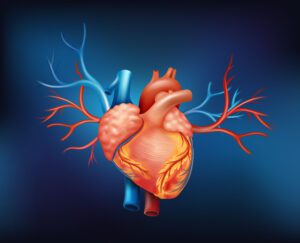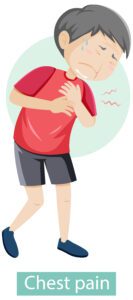Our heart is like a traffic controller for blood in our body. If it doesn’t pump right, we can have problems. When the heart’s squeezing and relaxing actions go wrong, it can cause heart failure or cardiac arrest. Now, let’s chat about What is heart failure, the different kinds, and signs, and how we treat heart failure.
What is heart failure?:-
Heart failure is when your heart doesn’t work well.
To help, your heart might:
- Get bigger to hold more blood.
- Grow more muscle to pump blood better.
- Beat faster to push more blood.
Your body also does some tricks:
- It makes blood vessels smaller to keep pressure up.
- Sends blood away from less important parts.
So, people often don’t know their heart is in trouble until it’s serious. People usually don’t see a doctor until they feel tired and have trouble breathing.

Types of Heart Failures?:-
A heart can stop working on the left or right side, and there are two types of heart failure: systolic and diastolic.
Let’s talk about the different kinds of heart failure:
- Left-sided Heart Failure: This is when the left ventricle struggles to pump blood, causing fluid buildup in the lungs and making it hard to breathe.
- Right-sided Heart Failure: The right ventricle, which pumps blood to the lungs, can’t do it well, usually happening after left-sided heart failure. This puts stress on the right ventricle, leading to failure and blood buildup in the left lung.
- Diastolic Heart Failure: This happens when heart muscles get stiff because of heart disease, making it tough for the heart to pump blood properly. It’s more common in females.
- Systolic Heart Failure: This occurs when heart muscles can’t squeeze well, more common in males.
Both systolic and diastolic heart failure can happen on either side of the heart.

Symptoms of heart failure?:-
Common signs of heart failure are:
- Not wanting to eat
- Belly swelling
- Feeling tired
- Heartbeat acting funny
- Heartbeat not staying regular
- Swelling in legs and ankles
- Coughing a lot
- Neck veins stand out
- Having trouble breathing
- Gaining weight fast
How Is Heart Failure Diagnosed?:-
Risk factors of Heart failure?:-
FAQ:-
Q1:- What are the 4 stages of congestive heart failure?
Ans:- There are four heart failure stages (Stages A, B, C and D)
Q2:- What is diastolic heart failure?
Ans:- This happens when heart muscles get stiff because of heart disease, making it tough for the heart to pump blood properly. It’s more common in females
Also read what staphylococcus aureus: 6 Body parts are affected by this infection


